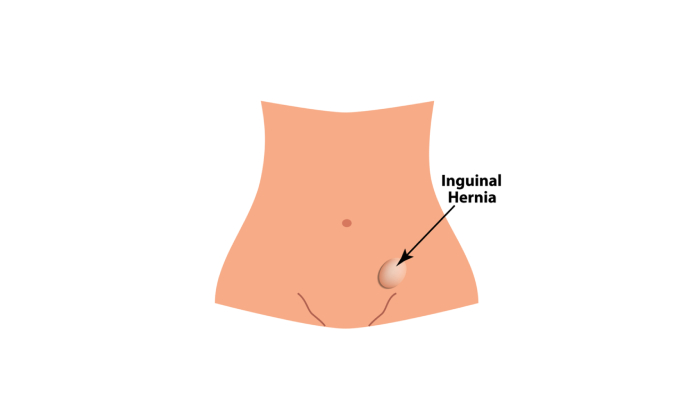Inguinal Hernia
An inguinal hernia occurs when part of the intestine or fatty tissue pushes through a weak spot in the abdominal muscles, causing a visible bulge. It may cause pain, discomfort, or pressure, especially when coughing, bending, or lifting heavy objects.
While not always painful, inguinal hernias don’t heal on their own and can lead to serious complications like strangulation. Surgery is the most effective treatment to repair the hernia and prevent further risks.
For expert hernia treatment, consult Dr. Ujwal Zambare, renowned hernia specialist in Wakad, Pune, offering advanced laparoscopic and open hernia repair techniques for safe and effective recovery.

Causes
Some inguinal hernias have no apparent cause. Others might occur as a result of:
- Increased pressure within the abdomen
- A preexisting weak spot in the abdominal wall
- Straining during bowel movements or urination
- Strenuous activity
- Pregnancy
- Chronic coughing or sneezing
Risk Factors
Factors that contribute to developing an inguinal hernia include:
- Being male. Men are eight times more likely to develop an inguinal hernia than are women.
- Being older. Muscles weaken as you age.
- Being white.
- Family history. You have a close relative, such as a parent or sibling, who has the condition.
- Chronic cough, such as from smoking.
- Chronic constipation. Constipation causes straining during bowel movements.
- Pregnancy. Being pregnant can weaken the abdominal muscles and cause increased pressure inside your abdomen.
- Premature birth and low birth weight. Inguinal hernias are more common in babies who are born prematurely or with a low birth weight.
- Previous inguinal hernia or hernia repair. Even if your previous hernia occurred in childhood, you’re at higher risk of developing another inguinal hernia.
Symptoms
- A bulge in the area on either side of your pubic bone, which becomes more obvious when you’re upright, especially if you cough or strain
- A burning or aching sensation at the bulge
- Pain or discomfort in your groin, especially when bending over, coughing or lifting
- A heavy or dragging sensation in your groin
- Weakness or pressure in your groin
- Occasionally, pain and swelling around the testicles when the protruding intestine descends into the scrotum
Complications
Complications of an inguinal hernia include:
- Pressure on surrounding tissues. Most inguinal hernias enlarge over time if not repaired surgically. In men, large hernias can extend into the scrotum, causing pain and swelling.
- Incarcerated hernia. If the contents of the hernia become trapped in the weak point in the abdominal wall, the contents can obstruct the bowel, leading to severe pain, nausea, vomiting, and the inability to have a bowel movement or pass gas.
- Strangulation. An incarcerated hernia can cut off blood flow to part of your intestine. Strangulation can lead to the death of the affected bowel tissue. A strangulated hernia is life-threatening and requires immediate surgery.
Prevention
- Maintain a healthy weight. Talk to your doctor about the best exercise and diet plan for you.
- Emphasize high-fiber foods. Fruits, vegetables and whole grains contain fiber that can help prevent constipation and straining.
- Lift heavy objects carefully or avoid heavy lifting. If you must lift something heavy, always bend from your knees — not your waist.
- Stop smoking. Besides its role in many serious diseases, smoking often causes a chronic cough that can lead to or aggravate an inguinal hernia.
An inguinal hernia occurs when part of the intestine or fatty tissue pushes through a weak spot in the abdominal muscles, causing a visible bulge. It may cause pain, discomfort, or pressure, especially when coughing, bending, or lifting heavy objects. While not always painful, inguinal hernias don’t heal on their own and can lead to serious complications like strangulation. Surgery is the most effective treatment to repair the hernia and prevent further risks.
For expert hernia treatment, consult Dr. Ujwal Zambare, a leading hernia specialist in Wakad, Pune, offering advanced laparoscopic and open hernia repair techniques for safe and effective recovery.
